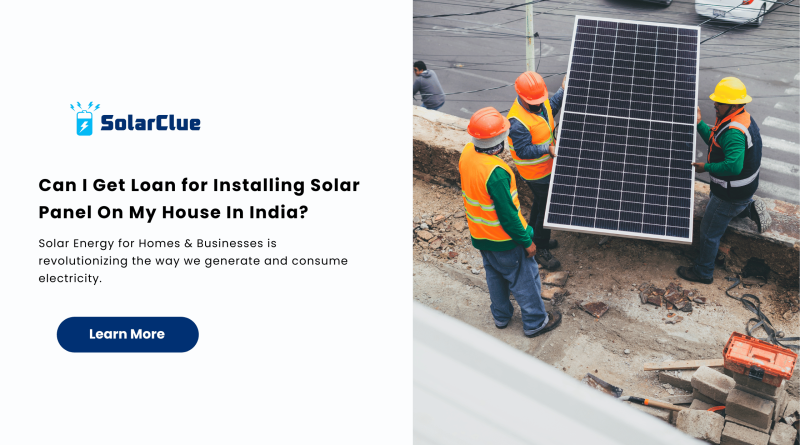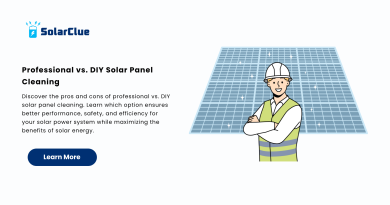Can I Get Loan for Installing Solar Panel On My House In India?
Investing in solar panels is a great way to reduce electricity bills and contribute to environmental sustainability. However, the initial cost can be significant, making financing options crucial for many homeowners and businesses. This blog will explore various financing options available in India, including government-backed loans, bank loans, and private financing. We’ll also cover eligibility criteria, interest rates, repayment terms, and how to calculate the payback period and return on investment (ROI).
Table of Contents
- 1 Government-Backed Loans for Solar Panel Installation
- 1.1
- 1.2 Bank Loans and Financing Options
- 1.3 Eligibility Criteria and Documentation Requirements
- 1.4 Interest Rates and Repayment Terms
- 1.5 Government Incentives and Subsidies for Solar Panels
- 1.6 Calculating Payback Periods and Return on Investment
- 1.7 The Impact of Interest Rates on Loan Costs
- 1.8 Case Studies of Successful Solar Panel Financing in India
- 1.9 Tips for Choosing the Best Financing Option for Your Needs
- 1.10 Frequently Asked Questions (FAQs)
Government-Backed Loans for Solar Panel Installation
The Indian government has introduced several initiatives to promote solar energy adoption, including government-backed loans:
| Loan Type | Description | Eligibility | Interest Rate | Repayment Terms |
|---|---|---|---|---|
| PM KUSUM Scheme | Targets farmers for solar pump installations and solarization of agricultural feeders. | Farmers, cooperatives, and panchayats. | Subsidized rates, often around 4-6%. | Flexible, usually up to 10 years. |
| IREDA Solar Loans | Indian Renewable Energy Development Agency (IREDA) offers loans for renewable energy projects. | Individuals, businesses, and NGOs. | Competitive, generally between 8-10%. | Up to 15 years, depending on the project. |
| State Government Loans | Various state governments offer subsidized loans for residential and commercial solar installations. | Varies by state, typically for residents or businesses within the state. | Typically lower than commercial rates, around 6-8%. | 7-10 years, depending on the state program. |
Bank Loans and Financing Options
Several banks in India provide loans specifically for solar panel installations:
| Bank | Loan Type | Interest Rate | Repayment Terms | Eligibility |
|---|---|---|---|---|
| SBI | Green Energy Loan | 8.85-10% | Up to 10 years | Homeowners, small businesses. |
| HDFC Bank | Home Improvement Loan | 9-12% | 5-15 years | Salaried individuals, businesses. |
| Axis Bank | Power Loan | 9-11% | Up to 10 years | Individuals, MSMEs. |
| ICICI Bank | Solar Financing | 8.75-11% | Up to 15 years | Homeowners, businesses. |
Eligibility Criteria and Documentation Requirements
Eligibility for solar panel financing typically requires the following:
1. Creditworthiness: A good credit score (usually 650 and above) is necessary to secure a loan with favorable terms.
2. Income Proof: Banks require proof of income, such as salary slips, bank statements, or IT returns, to assess repayment capacity.
3. Property Ownership: Proof of property ownership is required for loans related to residential or commercial properties.
4. Quotations from Solar Installers: Most lenders require a detailed quotation from a certified solar installer outlining the project costs.
5. Identity and Address Proof: Standard KYC documents like Aadhar card, PAN card, and utility bills are necessary.
Interest Rates and Repayment Terms
Interest rates and repayment terms can vary significantly:
1. Interest Rates: Typically range between 8-12% depending on the lender, loan type, and borrower’s credit profile.
2. Repayment Terms: Vary from 5 to 15 years, allowing flexibility in managing monthly payments. Shorter terms generally mean higher monthly payments but lower total interest paid.
Government Incentives and Subsidies for Solar Panels
In addition to loans, government incentives can reduce the overall cost of solar installations:
1. Subsidies: The Indian government offers subsidies under various schemes, reducing the upfront cost by 20-40%.
2. Tax Benefits: Under Section 80-IA of the Income Tax Act, businesses can claim deductions on profits from solar energy production.
3. Net Metering: Allows you to sell excess energy back to the grid, further enhancing the financial benefits of solar installations.
Calculating Payback Periods and Return on Investment
Calculating the payback period and ROI is essential to assess the financial viability of solar panel installation:
1. Payback Period:Payback Period=Total Installation Cost Annual Savings on Electricity Bills
Example: If your installation costs ₹2,00,000 and you save ₹30,000 annually on electricity, the payback period is approximately 6.67 years.
3. Return on Investment (ROI):ROI (%)=(Total Savings over the System’s Life−Total CostTotal Cost)×100
Example: If you save ₹7,50,000 over 25 years on a ₹2,00,000 investment, your ROI is 275%.
4. Comparing Different Financing Options
When comparing financing options, consider the following:
| Factor | Government-Backed Loans | Bank Loans | Private Financing |
|---|---|---|---|
| Interest Rates | Lower, often subsidized | Moderate | Higher, but more flexible |
| Eligibility | Strict, with more documentation | Based on credit score and income | Varies widely |
| Repayment Flexibility | Typically more flexible | Standard terms | Customizable, but often at a cost |
| Speed of Approval | Slower, due to government procedures | Moderate | Fast, but with higher interest rates |
The Impact of Interest Rates on Loan Costs
Interest rates significantly affect the total cost of the loan:
1. Higher Interest Rates: Lead to higher monthly payments and overall loan costs.
2. Fixed vs. Variable Rates: Fixed rates offer stability, while variable rates can fluctuate with market conditions, potentially increasing your costs.
Case Studies of Successful Solar Panel Financing in India
| Case Study | Details |
|---|---|
| Residential Solar Installation in Delhi | A homeowner used a government-backed loan under the PM KUSUM scheme to finance a 5 kW system, achieving ROI within 7 years due to net metering benefits. |
| Commercial Solar Project in Bangalore | A small business owner secured a loan from SBI’s Green Energy Loan scheme, installing a 50 kW system. The project paid off in 5 years, with significant energy savings contributing to the business’s growth. |
| Rural Solar Installation in Maharashtra | A farmer financed a solar water pump through a state government loan, leading to reduced irrigation costs and increased crop yield, with a payback period of just 3 years. |
Tips for Choosing the Best Financing Option for Your Needs
1. Assess Your Financial Situation: Determine how much you can afford in terms of upfront costs and monthly payments.
2. Research Government Programs: Take advantage of any available subsidies or low-interest loans.
3. Compare Interest Rates: Shop around for the best interest rates and terms from different lenders.
4. Consider Long-Term Benefits: Focus on the long-term savings and ROI, not just the initial costs.
5. Consult a Financial Advisor: If unsure, consult with a financial advisor who can help you choose the best financing option based on your circumstances.
Frequently Asked Questions (FAQs)
1: What are the best financing options for solar panel installation in India?
A: The best options include government-backed loans, bank loans, and private financing. Government schemes often offer lower interest rates and subsidies, making them a preferred choice.
2: How do I qualify for a solar panel loan?
A: You need a good credit score, proof of income, property ownership documents, and a detailed quote from a certified solar installer.
3: What are the typical interest rates for solar panel loans in India?
A: Interest rates typically range from 8-12%, depending on the lender and the borrower’s credit profile.
4: Are there any government incentives for installing solar panels?
A: Yes, the government offers subsidies, tax benefits, and net metering options to reduce the overall cost of solar installations.
5: How do I calculate the payback period for my solar panel system?
A: The payback period is calculated by dividing the total installation cost by the annual savings on electricity bills.
6: Can I combine different financing options for my solar installation?
A: Yes, you can combine different options, such as using a government loan for part of the cost and a bank loan for the remainder.
7: How does the interest rate impact the total cost of my solar loan?
A: Higher interest rates increase both your monthly payments and the total amount paid over the life of the loan.
8: What should I consider when choosing a financing option for solar panels?
A: Consider factors like interest rates, eligibility, repayment terms, and long-term benefits like ROI and energy savings.
Financing a solar panel installation in India can be complex, but with the right information and careful planning, you can choose the best option to suit your financial situation and energy needs. By understanding the available loans, incentives, and cost factors, you can make a well-informed decision that will benefit you in the long run.
Here at SolarClue®, we offer a smart, practical, and “beautiful” solution. You will be answered for all the questions related to Solar.
We provide all kinds of brands that are the Best Solar panels in India.
If you are the one who is planning for the solar power system. Don’t hesitate to contact our team!
Looking forward to empowering you with solar energy, just like hundreds of our other clients!



